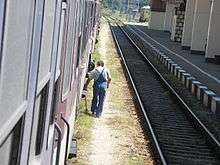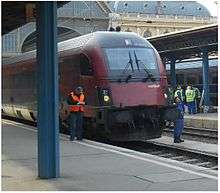Wheeltapper


A wheeltapper is a railway worker employed to check the integrity of train wheels and that axle boxes are not overheating.
Typically employed at large railway stations and in goods yards, they tap wheels with a long-handled hammer and listen to the sound made to determine the integrity of the wheel; cracked wheels, like cracked bells, do not sound the same as their intact counterparts (they do not "ring true").
Wheeltappers also check that the axle boxes are not overly hot by using the back of their hand.[1][2]
Although wheeltappers still operate in some eastern European countries, in countries with modern planned maintenance procedures and line-side defect detectors, such as hot box detectors, wheeltappers are redundant. The job is mostly associated with the steam age. Wheeltappers were vital to the smooth running of the railways as a cracked wheel or overheated axle bearing would lead to delays and the loss of revenue. These were particularly common in the 19th century, when axle bearings were lubricated by grease. At this time, metallurgy was a more haphazard science and thus it was impossible to test steel wheels for cracks: the role of the wheeltapper was of crucial importance.[3][4]
Anecdote
There is an anecdote of a wheeltapper who had worked diligently for years wheeltapping without ever questioning or understanding the purpose. This originated with Rudyard Kipling in Delhi, and is referenced in his work "Captains Courageous" of 1897,[5][6][7] although it had spread to the United States by 1932.[3][4] A German version of the story was told by the German humourist Sigismund von Radecki.[8]
See also
- Oh, Mr Porter!, a 1937 film in which Will Hay plays a wheeltapper at the start of the story
- The Wheeltappers and Shunters Social Club, a 1970s British television programme for which the set was a Working Men's Club
References
- ↑ Tooke, Jon. "West Somerset Railway :: Bogies". www.wsr.org.uk. Stephen Edge. Retrieved 21 February 2014.
- ↑ "Railway signal: or, Lights along the line". Railway Mission. London. 12. 1894."It was as instinctively the duty of a Christian to check evil as it was that of a wheel tapper to report a hot box"
- 1 2 Blake, John (5 January 1932). "Uncommon Sense". Schenectady Gazette. Google News. Retrieved 22 February 2014.
|section=ignored (help) - 1 2 "Clippings on 5 January 1932 › Page 6". newspapers.com (4616). Dauphin, Pennsylvania: Harrisburg Evening News. 5 January 1932. p. 6. Retrieved 22 February 2014. "... A young friend of mine told me the other day about some experiments he had been making with steel rails. By means of electricity it is now possible to examine rails for flaws before they are laid, and thus greatly to reduce the chance of serious accident on account of hidden defects. What is now being done with rails will soon be done with structural steel and all metal which goes into service where not only strength, but lasting strength is required. , - I remember in my childhood that when a train came into a station a man who had been waiting there with a hammer in his hand walked along the platform and tapped each wheel flange,' to ascertain whether or not there were any cracks in the wheel. ... That was the best test known then, but not a good one. And it had its drawbacks. Doubtless the reader remembers of the story of the railroad superintendent who was boasting to a friend of the efficiency of the organization he had built up. Pointing to a wheel tapper, he said, "That man has that job because of long faithfulness and experience." "Why does he tap the wheels?" asked the friend. The superintendent called the man over. "How long have you been with the road?" he asked. "Twenty years." "How long have you been tapping wheels?" "Eighteen years." "See," the superintendent said to his friend, "that's the kind of man we keep on an important job." Said the friend to the man: "Tell me why you tap the wheels." The workman looked puzzled. "Darned if I know," he said. To this man, whose type is nonexistent now in railroad operation, his job was his job, and there was no use trying to find out why he did it. , ... . He worked in the fog with which all uneducated and untrained people are surrounded, making no effort to get out of it..."
- ↑ At p. 223 line 6: "the clink-clink of hammers that tested the Krupp-steel wheels". "The Sons of Martha". The Kipling Society. 5 April 2012. Retrieved 21 February 2014.
- ↑ "Public Utilities Fortnightly". Public Utilities fortnightly. 33. 1944. Retrieved 21 February 2014. "The late Rudyard Kipling once told a story about a native wheel tapper who worked in the railroad terminal at Delhi. Because someone had set him to work tapping locomotive wheels without telling him why, he had been hammering away at ..."
- ↑ Hospitals. American Hospital Association. 22. 1948. Missing or empty
|title=(help) "The first was an "ignorant wheel tapper" who routinely and carefully tapped all wheels of the trains just as he had been told. He tapped wheels and drew his pay for many years without ever learning the reason for his tapping" - ↑ (German) von Radecki, Sigismund (1953). Das ABC des Lachens: ein Anekdotenbuch zur Unterhaltung und Belehrung. "Ein alter Mann kommt mit einem langen Hammer und klopft nach der bekannten Methode die Räder ab." ..."Der Mann: „Nächsten Juli werden's fünfzig Jahre." Passagier: «Dann sagen Sie mir, bitte, — was ist eigentlich der Grund, weshalb die Räder so beklopft werden?» Der Mann (kratzt sich den Kopf) : «Ich will verdammt sein, wenn ich's weiß!...» (English: An old man, a wheeltapper, was walking along, tapping the wheels with a long hammer. A passenger, his neighbour of fifty years, asked him that day: "Pray tell me : why do you tap the wheels?" The old man replied, scratching his head: "I'll be damned if I know.")